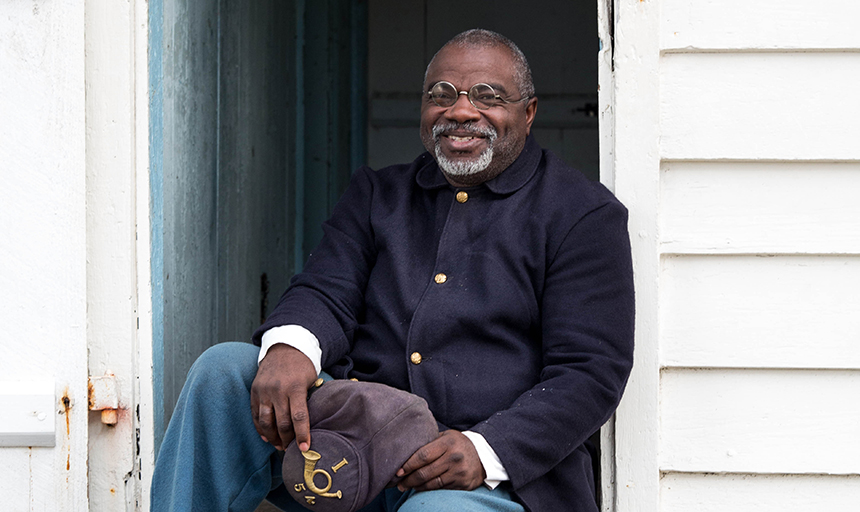Joseph McGill to Bring Living History to Roanoke
November 03, 2017

Public historian Joseph McGill will visit the Roanoke College campus Nov. 8-11. Founder of The Slave Dwelling Project, a nationally-renowned nonprofit working to identify and preserve former slave dwellings, he will lead several events focusing on the history and legacy of enslaved Americans. McGill formerly worked for the National Trust for Historic Preservation and now travels the country sleeping in former slave quarters to bring attention to the dwellings and what they teach us about their original occupants. "The people who lived in these structures were not a footnote in American history," he said.
Roanoke College has such a structure on its property, the Monterey Quarters, and it will be the site of two overnight events. The building is located behind Monterey, a home built in 1853 and purchased by the College in 2002. The Quarters has been unoccupied since it was acquired, but 17 students from the Intellectual Inquiry course "Historic Preservation: Monterey" have engaged in hands-on restoration of the Quarters to its original condition this semester. Led by a professional team of preservation specialists, the students have removed all non-historic materials such as plumbing, and electrical and wallboard components.
During the overnight events, students and other participants will join McGill as they spend the night in the Quarters and experience a taste of what it might have been like to live as a slave. These are just two of a series of events and activities happening at the College, which also will include: lectures by McGill and by Dr. Kelley Fanto Deetz, a professor of African-American history; a slave cooking demonstration and community feast; and storytelling.
The people who lived in these structures were not a footnote in American history.
Joseph McGill
Thursday, November 9
12-1 p.m. - "Black Lives Matter: A Forum on the Legacies of Slavery," featuring McGill and Roanoke professors Dr. Jesse Bucher and Dr. Gregory Rosenthal. Location: Logan Gallery, Bank Building, 223 E. Main Street, Salem, Virginia. Lunch is provided.
"A Night of Living History"-the first of the two overnight events at the Monterey Quarters. Signups for this event are closed.
Friday, November 10
"A Night of Living History"-the second of the two overnight events at the Monterey Quarters. At this time, there is room for additional participants. For more information, please contact Dr. Whitney Leeson at wleeson@roanoke.edu or Dr. Mark Miller at mmiller@roanoke.edu.
Saturday, November 11
"Behind the Big House" living history program. Admission to the living history program is free and includes live demonstrations of outdoor cooking, a community feast, storytelling, and tours of both Monterey Quarters and Monterey. For food preparation purposes, please RSVP by Nov. 4th to Whitney Leeson at Roanoke College (540-375-2541 or wleeson@roanoke.edu).
10:00-10:45 a.m-"Slave Dwelling Project" lecture by Joseph McGill. Location: Logan Gallery, Bank Building, 223 E. Main Street, Salem, Virginia.
11:00-11:45 a.m-.-"Bound to the Fire" lecture by Dr. Kelley Fanto Deetz. Location: Logan Gallery, Bank Building. Deetz is the author of the just-published book, "Bound to the Fire: How Virginia's Enslaved Cooks Helped Invent American Cuisine." She examines the lives of enslaved plantation cooks from colonial times through emancipation and beyond and restores these forgotten figures to their rightful place in the history of the South and of America.
12:00-1:30 p.m.-Slave cooking demonstration and community feast. Location: Monterey Quarters. Jerome Bias, a specialist in slave foodways as well as a furniture maker who uses 18th-century woodworking techniques, cooks at living history programs to show that enslaved people were "talented, life-living individuals."
1:30-2:00 p.m.-Storytelling by Donativus Williams. Location: Monterey Quarters. Williams worked for several years as a Living History Interpreter at Historic Brattonsville, Cultural Heritage Museums of York County. He delivers powerful, interpretive experiences of enslaved peoples.
These various events are sponsored by the Copenhaver Scholar-in-Residence Program, the Roanoke College History Department, the Roanoke College Historical Society, the Roanoke College Office of Multicultural Affairs and the College's Black Student Alliance.